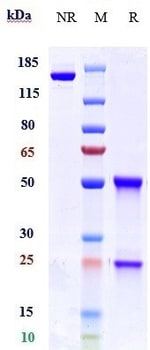Learn More
Invitrogen™ CD223 (LAG-3) Monoclonal Antibody (eBioC9B7W (C9B7W)), eBioscience™, Invitrogen™
Rat Monoclonal Antibody
Marke: Invitrogen™ 14-2231-82
Beschreibung
Description: The eBioC9B7W monoclonal antibody recognizes mouse CD223 (LAG-3, LAG3) protein expressed by activated alpha/beta-TCR bearing T cells, a subset of gamma/delta-TCR bearing T cells and a subset of NK cells. CD223 is a 70 kDa type I transmembrane protein with a structure that is similar to CD4. However, a soluble form of human CD223 has been detected by ELISA in human serum, and data suggest that mouse CD223 is proteolytically cleaved in the D4 domain. This results in a 54 kDa fragment containing all the extracellular domains, and a 16 kDa fragment containing the intracellular and transmembrane domains. The 54 kDa can remain membrane-associated or be released as soluble CD223. CD223 binds to MHC class II with higher affinity than CD4, and it is thought that this interaction is involved in the negative regulation of T-cell activation and homeostatic proliferation. Furthermore, CD223 is expressed by CD4+CD25+ regulatory T cells, and it has been suggested that CD223 may be involved in their regulatory function. Applications Reported: This eBioC9B7W (C9B7W) antibody has been reported for use in flow cytometric analysis, immunoprecipitation, and ELISA. (Please use Functional Grade purified eBioC9B7W (C9B7W), cat. 16-2231, in functional assays.). Applications Tested: This eBioC9B7W (C9B7W) antibody has been tested by flow cytometric analysis of anti-CD3 and anti-CD28-activated mouse splenocytes. This can be used at less than or equal to 0.5 μg per test.
LAG-3 is a 70-kDa surface glycoprotein belonging to the Ig superfamily with homology to CD4. LAG-3 binds to MHC class II with higher affinity than CD4 and is thought to be involved in the negative regulation of T cell activation and homeostatic proliferation. Surface expression of LAG-3 has been reported on activated T cells (including regulatory T cells) and NK cells. CD8+ T cells usually express LAG-3 at significantly higher levels than CD4+ T cells. Coexpression of LAG-3 and CD49b has been proposed to identify human and mouse Type 1 regulatory T cells (Tr1 cells).
Spezifikation
| CD223 (LAG-3) | |
| Monoclonal | |
| 0.5 mg/mL | |
| PBS with 0.09% sodium azide; pH 7.2 | |
| Q61790 | |
| LAG3 | |
| Affinity Chromatography | |
| RUO | |
| 16768 | |
| 4°C | |
| Liquid |
| ELISA, Flow Cytometry, Functional Assay, Immunoprecipitation | |
| eBioC9B7W (C9B7W) | |
| Unconjugated | |
| LAG3 | |
| Activation-induced cytidine deaminase-linked autoimmunity protein; Aida; CD223; FDC; LAG3; LAG-3; Ly66; lymphocyte activating 3; lymphocyte activation gene 3 protein; lymphocyte-activation gene 3; Secreted lymphocyte activation gene 3 protein; sLAG 3; sLAG3; sLAG-3; soluble LAG 3lymphocyte activating 3; soluble LAG3 | |
| Rat | |
| 100 μg | |
| Primary | |
| Mouse | |
| Antibody | |
| IgG1 κ |
Produktvorschläge
Customers who viewed this item also viewed.
Bitte geben Sie uns Ihr Feedback zu den Produktinhalten, indem Sie das folgende Formular ausfüllen.
For Research Use Only.

















